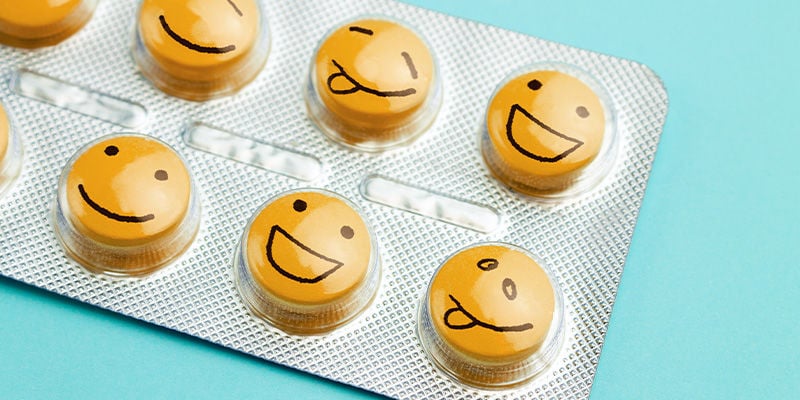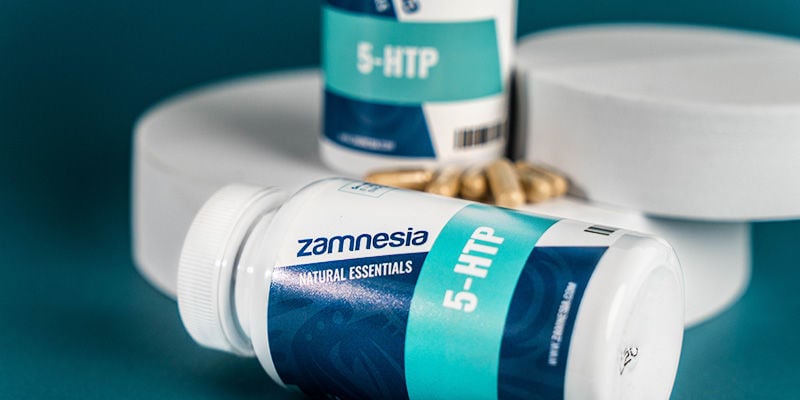
Feel-Good Hormones: How They Affect Your Well-Being
Ever thought about what makes you feel good? Did you know that a series of hormones are influencing your mood even as you read this? Read on to find out all you need to know about feel-good hormones, their function within the body, and how you can influence them simply with the activities you carry out during the day.
What is it that makes us feel good? Sometimes our mood can change instantly. This could be from treating yourself to something new, hanging out with friends, or watching an episode of your favourite TV show. But is it just the act that brightens your day, or is there more to it? You might be surprised to learn that a series of hormones are primarily responsible for how you feel daily. In this article, we delve into everything you need to know about how they impact your well-being, and the best natural ways to boost your levels of feel-good hormones.
What are feel-good hormones?

What do we mean when we say “feel-good hormones?”. This term describes the various hormones in our bodies that have a positive effect on our mood. Produced in various glands, they promote positive sensations such as pleasure, intimate connection, and happiness. Of course, these feelings play a massive role in daily life and, without sounding too heavy, are largely responsible for our overall enjoyment of it. However, there are many factors that can impact the production of such hormones.
Which feel-good hormones exist?

So, which hormones are responsible for providing these upbeat feelings? Below, we’ll break down the four primary examples. Whether you’re acquainted with these hormones or not, collectively they offer positive sensations that make life more enjoyable.
🧠 Dopamine
Definitively known as the “happy” hormone, dopamine is a type of neurotransmitter that plays a crucial role in the response sensations for reward, pleasure, and happiness. It is also associated with other functions, such as memory and learning. Dopamine levels can be boosted by doing activities that make you feel happy or relaxed, such as yoga, going for a walk, or even reading a book.
🧠 Serotonin
Serotonin, otherwise known as the “feel-good” hormone, is responsible for regulating many functions within the body, such as digestion, sleep, and memory. However, this neurotransmitter also plays a pivotal role in feelings of satisfaction, optimism, and happiness. Some potential ways to boost serotonin levels include getting at least 15 minutes of sunlight daily, exercising, and eating a healthy and varied diet.
🧠 Endorphins
Often associated with exercising, especially running, endorphins are thought to play a role in the “runner's high”. This is essentially your body's natural way of relieving pain, and is produced as a way to deal with stress or discomfort. As already hinted at, the main force behind the production of endorphins is aerobic exercise. However, other activities, such as having sex or working out, can also potentially increase endorphin levels.
It’s worth noting that the runner’s high is also associated with the production of endocannabinoid neurotransmitters, like anandamide. Therefore, it may be that a combination of endorphins and endocannabinoids is responsible for this feel-good phenomenon.
🧠 Oxytocin
Oxytocin is also known as the “love” hormone, and is most commonly associated with childbirth, building parent-child relationships, and breastfeeding. It also plays a role in empathy, trust, and bonding. Levels of oxytocin are typically increased through physical contact and affection. So something as simple as a massage or giving someone a hug would be enough to boost oxytocin levels.
How are feel-good hormone levels modulated?

So, how does your body control the production and release of these chemicals? While we've touched upon some activities that have the potential to boost hormone levels, there are numerous other factors that can play a role.
Arguably one of the most common ways to increase feel-good hormone production is through prescription medication. For example, SSRIs (selective serotonin reuptake inhibitors) are prescribed to increase serotonin levels in those experiencing issues like anxiety, OCD, and/or depression. However, these types of medications work differently for everybody, and are by no means a “quick fix”.
Conversely, illicit drugs are also known to potentially boost feel-good hormone levels. For example, cocaine has the potential to raise dopamine hormones by blocking the dopamine transporter and causing a buildup of the substance in the brain. However, there are many other ways to boost feel-good hormones without turning to recreational drugs!
15 ways to boost feel-good hormones naturally

If you're looking to boost your levels of feel-good hormones naturally, you might be surprised to learn that there are many ways to do it. The following suggestions may not apply to everyone, but all are known for their potential to have you feeling good. So, see what works for you, and enjoy the surge in hormones that follows.
Exercising
This might sound like an obvious choice, but the positive effects of exercise on the mood can't be denied. As mentioned, feel-good endorphins and endocannabinoids are released during exercise, and have the potential to make you feel euphoric. Moreover, aerobic activities such as cycling, swimming, or running also have the potential to increase serotonin levels. So, the next time you're feeling upbeat after finishing that 10k run, it could very well be these feel-good hormones at work!
Sleeping
As we know, sleeping is essential to daily function. Getting a good night's sleep really is “make or break”, and can dictate how we feel throughout the day. Well, our feel-good hormones are also massively influenced by this too. Sleeping has the potential to increase the production and release of dopamine, as well as refresh you and prepare you for the day ahead.
Laughing with friends
How good does it feel to hang out with friends, sharing a joke and laughing together? Well, they do say that “laughter is the best medicine”, and that adage is certainly relevant in the realm of feel-good hormones. In fact, social laughter has the potential to boost both dopamine and endorphin levels, making everyone feel good. What's more, this isn't exclusive to just friends, as sharing a laugh with your partner can also produce a release of oxytocin, bringing you closer together.
Cuddling with a loved one

Whether a family member, friend, or partner, hugging or cuddling someone has the potential to release oxytocin in the brain. This allows you to feel closer to the person in question, and generally makes you feel good. So, if you're feeling like something is lacking, give someone a hug; it could be just the ticket to brightening your mood.
Listening to feel-good music
Ever wondered why that pop song on the radio makes you feel good and uplifted? Well, it's not just down to chance. Listening to music can give you a massive boost of happy hormones, namely dopamine. If you're in need of a mood boost, put on your favourite song and get swept away. What's more, playing a musical instrument in a group also has the potential to yield similar results, so get your band together!
Aromatherapy

Used for a multitude of reasons, aromatherapy also has a place in boosting feel-good sensations. Something as simple as smelling peppermint, sandalwood, or even taking in the aroma of freshly cut grass has the possibility of enhancing your mood. While the science behind this is fairly limited, aromatherapy most certainly has the potential to release feel-good hormones.
Petting your dog or cat
There's no denying that petting your animals is a great way to feel good. For you and for them! Giving your dog or cat some affection will boost oxytocin levels for both of you, and make you feel closer to them. Whether it's your pet or you're at a friend's house, take the time to pet some animals and feel the uplifting boost.
Getting a massage
Getting pampered is a way to potentially raise the levels of all four feel-good hormones. Whether you're going to a licensed massage parlour or getting your partner to do it, expect a surge of endorphins, dopamine, serotonin, and oxytocin. Let yourself get washed away in a sea of feel-good sensations.
Meditating

Taking some time out of your day to centre yourself could make all the difference in terms of boosting feel-good hormones. Find a quiet and comfortable place, and set aside 5 minutes for yourself to meditate. Allowing thoughts to pass through your mind (both positive and negative) without engaging with them can potentially influence dopamine levels. So give it a try!
Having sex
A surefire way to raise oxytocin levels is to have sex. There's certainly no denying that it's a great way to feel good, and the added bonus of boosting feel-good hormones makes it a win-win, no matter how you look at it. The next time you're in bed (or wherever you choose) with your partner, take note of just how good you feel before, during, and after having sex. Maybe keep a mental note, as reaching for a notepad or telling your partner directly might kill the mood!
Spending time outdoors
Being cooped up all day in front of screens is no good for anybody, so pick yourself up, venture outside, and feel the effects of exploring the world. Whether you're walking to the shops for some lunch or going on a massive hike, such activities have the potential to raise levels of feel-good hormones such as serotonin and endorphins.
Catching some sun
Building on the above, though it might feel like a tall order in those cold and dreary winter months, taking time out to soak up some sun can do a lot to improve your mood. Just like spending time outdoors in general, getting some sun can increase levels of dopamine while also providing you with some much-needed vitamin D. So whether on the move or sitting on a park bench enjoying a coffee, soak up some sun, no matter the weather.
Consuming certain foods or drinks
You are what you eat; and if you want to boost your feel-good factor, you might want to start by looking at what you're consuming each day. It's thought that foods rich in vitamin B6, such as tuna, chickpeas, and potatoes, can possibly boost both dopamine and serotonin levels. However, spicy foods may also release endorphins. So if you're thinking of choosing that chicken vindaloo on the menu, it could have the potential to make you feel good (eventually).
Recalling happy memories
Remember that holiday you took with friends? What a great time that was. Well, thinking of days gone by can also be a great way to boost your mood. Similar to sharing a laugh with friends, levels of dopamine and endorphins can be raised just by recalling happy memories. Give it a try the next time you need a little pick-me-up.
Practising yoga
Known for its zen-like qualities, yoga is a workout for both the body and mind. As well as demonstrating the potential to improve energy levels and sleep quality, yoga is also favoured for its mood-boosting capabilities. Head to your local yoga class, or roll out your mat at home, and feel a rush of endorphins.
Supplementing feel-good hormones

Of course, there are plenty of other ways to boost your feel-good hormones. One popular avenue is to introduce some supplements into your daily life. Taking a capsule or two is a convenient way to influence hormone production, especially for busy individuals. And there are plenty of options that fit the bill. Of course, if you have any concerns or questions, or are currently taking any medication, always consult your doctor before picking out supplements.
Those looking to potentially boost serotonin levels can look to products such as 5-HTP and tryptophan capsules, as well as St John's wort extracts. 5-HTP plays a key role in the synthesis and transmission of serotonin and is full of vitamin. The same is true for tryptophan.
In terms of boosting dopamine, users can opt for turmeric capsules, Ginkgo biloba extracts, and even Mucuna pruriens (velvet bean), to name just a few choices. These easy and accessible products are ideal for daily use.
Find your feel-good today

As you can tell by this point, there's a lot that goes into “feeling good”, and everyone's experience will differ somewhat. However, it's clear that the four hormones mentioned in this article are incredibly influential in how we feel each and every day. So if you feel you could do with a slight tune-up, consider trying some of the natural activities and actions listed above. And, if you're looking for some mood-boosting supplements, simply head over to the Zamnesia Healthshop to get your pick of the finest products available right now.





 United States
United States











